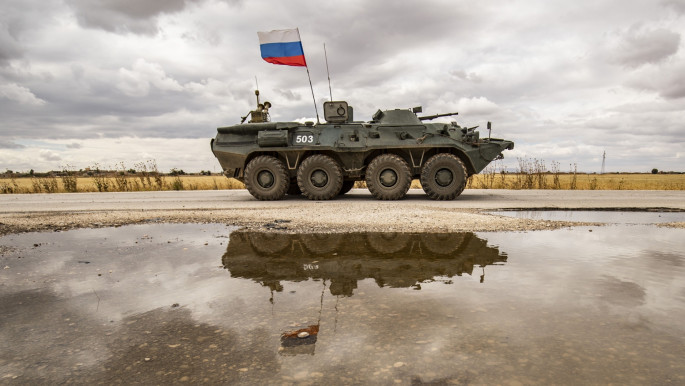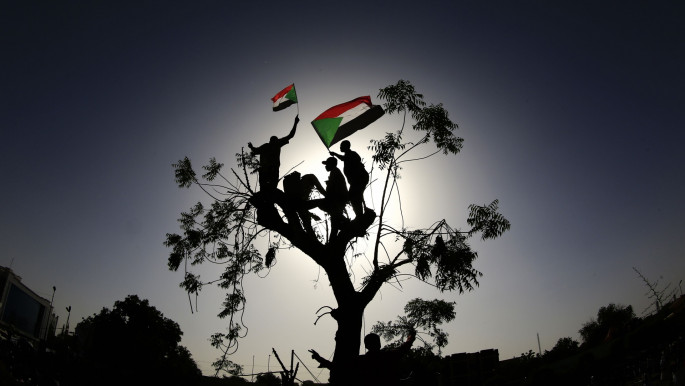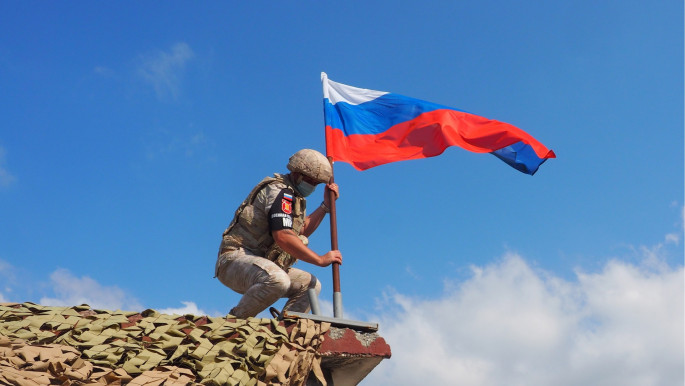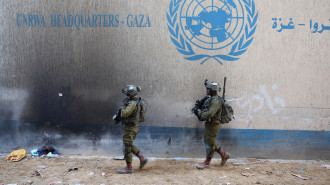A gateway to Africa: Russia's new naval base in Sudan
The naval logistics base will house more than 300 military and civilian personnel as well as up to four warships, including vessels with nuclear propulsion.
The facility near Port Sudan will be the first Russian military base in Africa and only the second naval base outside of the former Soviet Union, after Tartus in Syria.
Although Moscow has issued assurances that the new logistics centre would be defensive in nature and built with the purpose of maintaining peace and stability in the region, it is expected that Russia will fortify its new African outpost with an advanced surface-to-air missile system.
Russia will also reportedly provide Sudan with additional weapons to protect the facility while permitting Russian troops to be stationed outside the naval base on Sudanese territory.
A blow to Washington?
The Russia-Sudan agreement comes just a month after the Trump administration announced it would remove Sudan from its State Sponsors of Terrorism blacklist, seen as a reward for signing a normalisation deal with Israel.
 |
The naval facility near Port Sudan will be the first Russian military base in Africa and only the second naval base outside of the former Soviet Union |  |
In light of this breakthrough, the Kremlin's agreement with Khartoum could be seen as an unpleasant surprise for the US. Some have described the move as a blow to Washington's hopes of having greater leverage over transitional authorities in Sudan following the ouster of long-time dictator Omar al-Bashir.
Samuel Ramani, a geopolitical analyst focusing on Russian foreign policy in the Middle East, told The New Arab that Sudan is pursuing a multi-vector foreign policy approach.
Khartoum has balanced ties with Middle East rivals such as Turkey, Qatar and the UAE and Saudi Arabia, both under Bashir and since the transition, and is attempting a balancing strategy of maintaining strong ties with the US, Russia and China. "The more partnerships that Sudan cultivates, the more investment it can receive in its cash-strapped economy," he said.
 |
|
| Warm waters at last: Russia's expanding military footprint in the Middle East |
Sergey Sukhankin, a researcher at the Jamestown Foundation, explains that Sudan may be using Russia's naval base as a means to apply additional pressure on stakeholders interested in expanding their presence in the country, demonstrating that other players, including Russia, are aspiring to fortify their positions in Sudan.
"It is not just about the US, but the message is also designed for China, Turkey and some other players from the Gulf States," Sukhankin told The New Arab.
In Ramani's view, US officials are aware of Sudan's balancing strategy and have not made cooperation or arms purchases from Russia a sticking point in their efforts to establish stronger relations with Khartoum. Therefore, the US response to Russia's base in Sudan is unlikely to be overtly critical.
After all, the Sudanese decision to host a Russian base is not necessarily that surprising, since both countries established close bilateral ties under Bashir's rule. The deposed authoritarian ruler visited Putin in 2017 and supported Russia's intervention in Syria while backing Syrian President Bashar al-Assad.
In fact, the former leader of Sudan had made it abundantly clear to the Russians that Khartoum was ready to welcome Moscow's presence in the country, and the Kremlin simply continued these talks with the new authorities, led by Lt-Gen Abdel Fattah Abdelrahman Burhan.
 |
The naval base in Sudan could provide Russia with a foothold in Africa and the possibility of controlling crucial shipping routes in the Red Sea |  |
Is Sudan Moscow's gateway to Africa?
The naval facility in Port Sudan certainly heralds the return of Russia to the geopolitical map of Africa and its surrounding maritime routes and oceans. By using Sudan as a jumping board to other Sub-Saharan countries, Sukhankin believes that Russia is likely to increase its efforts not only in Central Africa - via the Central African Republic, where Moscow in the past few years has established a security and military presence - but also in Sahel G5 countries, especially in light of the failure of French-led efforts to eliminate terrorist threats in the region.
Besides geo-economical objectives of exerting greater influence over the country and seeking leverage over Sudan's political future, the naval base also offers Moscow a possibility to potentially obstruct transportation via the Red Sea (Suez Canal) as a means to re-direct at least parts of international trade to the Northern Sea Route, which is one of the key priorities for Moscow, according to Sukhankin.
Arms sales along with security and military arrangements have already played a significant role in the country's geopolitical plans, with Russia a major supplier of arms to the region. With a market share of 37.6 percent, Russia is the top weapons supplier to Africa and according to the Stockholm International Peace Research Institute (SIPRI), Africa (without Egypt) accounted for 16 percent of Russian arms exports between 2014-19.
 |
|
| Read more: How US blackmail pushed Sudan to normalise ties with Israel |
While Algeria and Egypt are by far the most valuable customers of Russia's arms industry, sales will only increase in the future as Moscow has signed weapons deals with Angola, Nigeria, Sudan, Mali, Burkina Faso and Equatorial Guinea, including for jets, helicopters, anti-tank missiles and engines for fighter planes. Moreover, Russia has concluded military cooperation agreements with 28 countries in Africa, according to the Institute for the Study of War.
Russia's military and security arrangements in the continent also involve the use of private mercenaries like the Wagner Group, known for supporting warlord Khalifa Haftar in Libya. Their activities have also been reported in Sudan as well as in the Central African Republic and in other countries. As they are mostly self-financed, their operations and engagements give Russia an opportunity to exert influence without major risks or costs.
However, it would be wrong to assume that Russia's only motivation is to increase its arms sales. According to CSIS, an American think tank, Moscow has tripled its trade with Africa, from $6.6 billion in 2010 to $18.9 billion in 2018, and invested in the oil and gas sectors as well as successfully promoting its nuclear power expertise.
 |
With a market share of 37.6 percent, Russia is the largest weapons supplier to Africa |  |
Will there be more Russian bases in Africa?
According to a leaked German Foreign Ministry report titled "Russia's New African Ambitions," which first appeared in German daily Bild, Russia is allegedly seeking permission to establish military bases in six nations, including Egypt, the Central African Republic, Eritrea, Madagascar, Mozambique and Sudan.
While it is true that Russia is interested (partly) in re-gaining its influence in Africa, Sukhankin is rather cautious about further Russian military expansion in the continent. "Russian policy-makers clearly know that one of the main reasons for the Soviet economy to collapse was overstretching – seeking to be everywhere," he told The New Arab. "This is what Russia will try to avoid despite strong interest in expanding its presence/influence in Africa."
 |
|
| Read more: Russia's growing influence in Iraq: A new challenge for the US |
According to Sukhankin, when the leadership of Sudan and the CAR offered Russia an opportunity to create bases in 2018/19 the Russian reaction was not as enthusiastic as one might have expected, since deeper involvement in Africa would eventually require more investments and resources that Moscow does not have.
Ramani also says that there was widespread speculation that Russia would use its support for Khalifa Haftar to establish a base in eastern Libya, but negotiations on that have not taken off. He also added that Russia considered creating a logistics center in Eritrea and Russian Foreign Minister Sergei Lavrov visited Eritrea in 2018, but this proposal has not progressed either.
Russia has vehemently denied the possibility of establishing a base in Somaliland, even though the New York Times reported in January that Berbera in Somaliland was the possible location of a Russian base. Sukhankin, on the other hand, mentions the possibility of Mozambique as a potential candidate as the country has been unable to cope with an Islamic insurgency in Cabo Delgado province, as well as some of the Sahel G5 countries.
The main question is whether Moscow will consider the mistakes of the USSR. With Russia's strategy in Africa valuing flexibility and lacking financial depth, it is more than likely that Sudan will be its only base on the continent for the foreseeable future.

![Palestinians mourned the victims of an Israeli strike on Deir al-Balah [Getty]](/sites/default/files/styles/image_684x385/public/2024-11/GettyImages-2182362043.jpg?h=199d8c1f&itok=xSHZFbmc)


![The law could be enforced against teachers without prior notice [Getty]](/sites/default/files/styles/image_684x385/public/2178740715.jpeg?h=a5f2f23a&itok=hnqrCS4x)
 Follow the Middle East's top stories in English at The New Arab on Google News
Follow the Middle East's top stories in English at The New Arab on Google News


